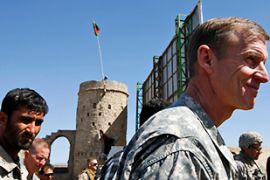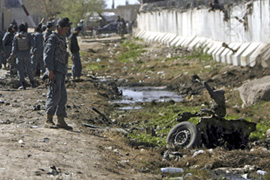Major Afghan offensive ‘under way’
General Stanley McChrystal says US efforts to retake control of Kandahar province has begun.

A major offensive in Kandahar, once a Taliban stronghold, would follow the current military operation in neighbouring Helmand province,which appears to have largely pushed back the Taliban and given the government a chance to take control.
‘Reversing momentum’
“What you are going to see in the months ahead, without giving too much detail, is a number of activities to shape the political relationships in and around Kandahar,” he said.
McChrystal said there would also be a “series of activities” to boost security, like more partnering with Afghan police inside Kandahar city and boosting troop levels in the surrounding areas.
“If you control the environs around Kandahar, you go a long way to controlling Kandahar,” he said.
| In depth | |||||||||||||||||||||||||||||||||||
|
McChrystal has not given a timeline for the operation but said last week in Kabul that troops would be at full force for Kandahar operations by the early summer.
Kandahar is the next target in major military operations to eradicate the Taliban from areas they have controlled, in many cases in tandem with drug cartels, over the years since their regime was overthrown in 2001.
Operation Moshtarak- “together” in Dari and Pashto – is the first major test of the strategy of Barack Obama, the US president, to take on the Taliban and end the eight-year conflict with one of the biggest offensives since the 2001 US-led invasion.
It is designed to clear Taliban fighters from the Marjah region of the southern province and hold it so that the civilian administration can establish itself.
The strategy comprises military, political and civilian approaches in four stages dubbed “shape, take, hold and build” and aims to ensure that once eradicated, the Taliban threat does not re-emerge.
Al Jazeera’s Hoda Abdel-Hamid, reporting from Kabul, the Afghan capital, said: “These are the very early stages of the Kandahar offensive.
“We are at the ‘shape’ phase of the operation, however, there are military offensives being carried out around the city of Kandahar to facilitate a larger offensive in the coming weeks.”
The campaign in Kandahar is seen as a crucial test of Obama’s strategy to reverse Taliban momentum after more than eight years of war.
Initial stages of the strategy aimed at speeding up the war’s end began in Kandahar province around November, a Western official told the AFP news agency, on condition of anonymity.
“The emphasis increased last November, and most of it is invisible because it is aimed at understanding the situation on the ground, the political landscape and the human terrain,” he said.
“We all understand how important and iconic Kandahar is for the Taliban – it was their first foothold.”
Taliban stronghold
Zalmai Ayobi, a spokesman for Kandahar governor Turyalai Wisa, said consultations had begun with tribal elders and community leaders as the long-term goal was to “expand good governance to all districts and villages”.
Kandahar city, is Afghanistan’s second largest city after Kabul and the birthplace of the Taliban, who ruled Afghanistan from 1996 until their overthrow in the 2001 US-led invasion.
 |
| Suicide attacks are frequently carried out in Kandahar, a Taliban stronghold [Reuters] |
The Taliban claimed responsibility for a multiple suicide bomb attack on the city last Saturday that killed 35 people,saying it was intended to sabotage the planned offensive.
Bruno Kasdorf, chief of staff at the International Security and Assistance Force (Isaf) said there would “definitely” be an operation in the northern province of Kunduz, where most of Germany’s 4,300 troops in Afghanistan are based.
He declined to give details but Lieutenant Colonel Michael Kaemmerer, an Isaf spokesman, said it would be similar in “type not the scale” to Moshtarak.
The number of foreign troops under US and Nato command is set to rise to 150,000 by August, with most of the new deployment heading to the south.
The 15,000 US, Nato and Afghan troops currently deployed to Helmand’s Marjah and Nad Ali areas for Operation Moshtarak will remain in the province for other offensives there, the spokesman said.
Newly arrived troops would be sent to Kandahar, he said, adding that foreign troops would remain in both provinces to ensure security was maintained and the Taliban did not re-emerge.
But in the battle to win the support of local people, perceptions that Kandahar’s leaders are corrupt could be an obstacle to long-term success, military officials have said.
Ahmed Wali Karzai, the elected leader of Kandahar’s provincial council, has long denied allegations that he has ties to the three-billion-dollar-a-year illicit drug trade.
